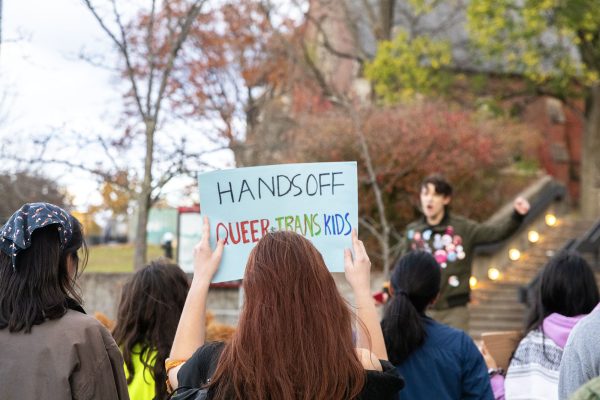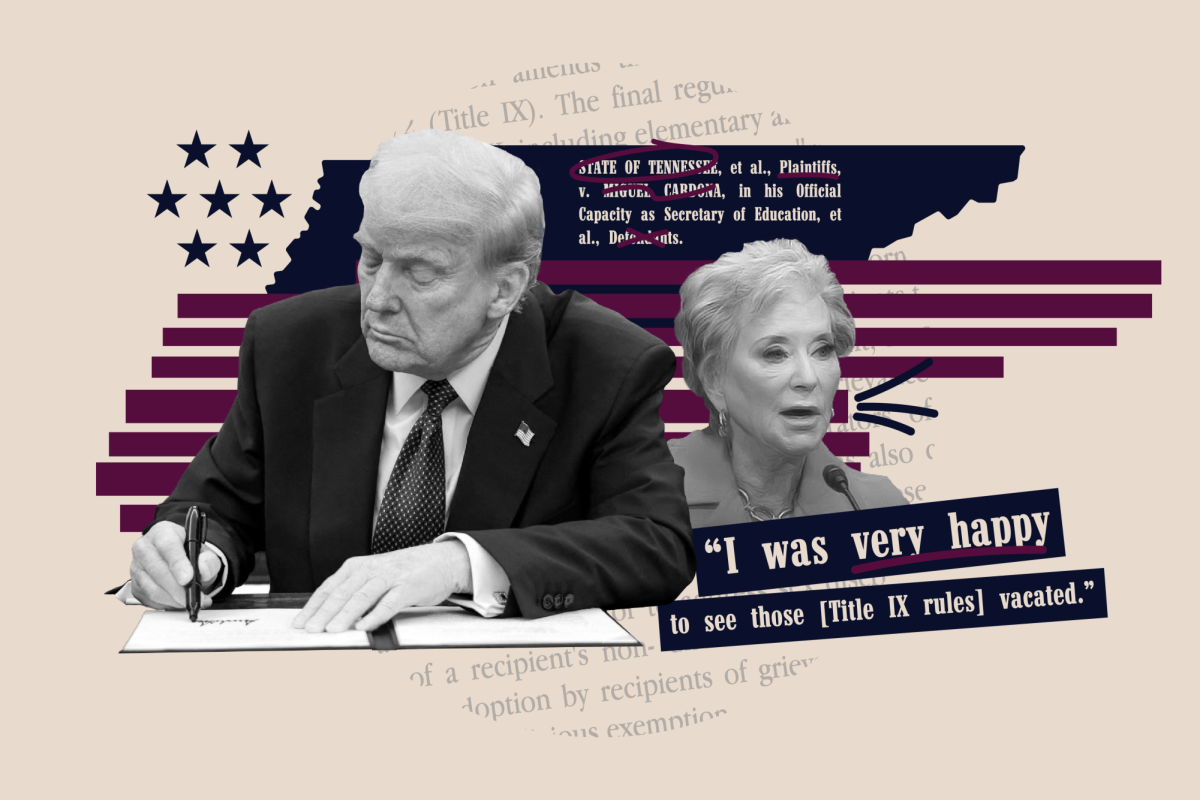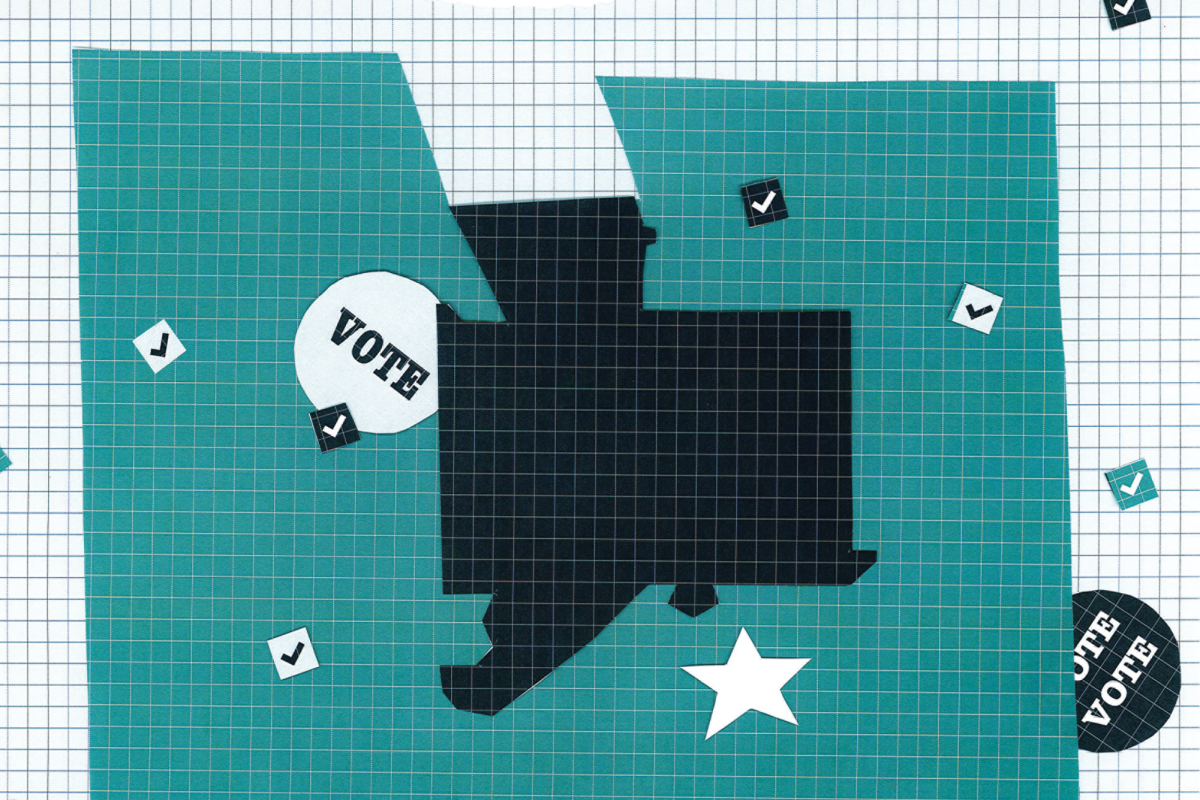The U.S. Department of Education’s 2024 Title IX regulations, which expanded protections for LGBTQ+ students, were rescinded after a Jan. 9 federal court ruling. The changes in Title IX along with President Donald Trump and his administration’s return to Washington, D.C., have created concerns among Ithaca College students and faculty over the protection of transgender students.
Title IX of the Education Amendments of 1972 is a national law that protects against discrimination based on sex in educational institutions. All educational institutions that receive federal funding — including Ithaca College — must comply with Title IX regulations.
On April 29, 2024, the Biden administration released Title IX regulations that explicitly state that discrimination based on gender identity is included under the definition of discrimination on the basis of sex. The regulations were in effect from Aug. 1, 2024, until Jan. 9, 2025, after a federal judge in Kentucky ruled that the regulations exceeded the Department of Education’s authority and violated the First Amendment by requiring teachers to use students’ preferred names and pronouns.
Timeline of gender identity under Title IX
In 2016, the Obama administration issued guidance that expanded the scope of sex-based discrimination to include gender identity. The Department of Education under the first Trump administration interpreted Title IX’s prohibition on discrimination based on sex to not include gender identity.
Former President Joe Biden issued an executive order Jan. 20, 2021, that used the precedent set in Bostock v. Clayton County — the landmark 2020 Supreme Court case that expanded Title VII of the Civil Rights Act of 1964’s prohibition on discrimination based on sex to include gender identity and sexual orientation — to expand the definition sex-based discrimination in Title IX to include gender identity and sexual orientation.
On Jan. 20, 2025, Trump signed an executive order, “Defending Women from Gender Ideology Extremism and Restoring Biological Truth to the Federal Government,” which nullified the executive order from Biden that expanded the definition of sex-based discrimination in Title IX to include gender identity and sexual orientation.
On Feb. 5, Trump signed an executive order, “Keeping Men Out of Women’s Sports,” which interprets Title IX as prohibiting transgender women from participating in women’s sports. The order also threatens to rescind funding from programs that do not comply with the order.
Title IX at Ithaca College
Title IX Coordinator Linda Koenig wrote an Intercom post following the Jan. 9 decision informing the college of the changes in Title IX. She said that despite the changes in Title IX, students and faculty can still report discrimination by following the guidelines in section 2.7 of the Policy Manual.
“I want students to hear, and I want employees and faculty to hear that if they experience discrimination based on their gender identity or expression, that should continue to be reported to my office,” Koenig said. “We will take those reports seriously, and we will address them using the appropriate procedures and processes available to us.”
Junior Marshall Long, a transgender athlete on the college’s club softball team, said that playing his sport has helped him find a sense of community since he was a kid. He said it is a shame that the rollback of regulations protecting gender identity has discouraged trans people from being unapologetically who they are.
“I am afraid and a lot of my peers are afraid,” Long said. “But the thing is, in instances like this, joy is one of the most important acts of resistance. Continuing to play your sport, continuing to partake in whatever activity you choose to partake in, is so important in the longevity of trans people as a whole.”
The college provides resources for transgender students like a voice and communication modification program and a booklet on the legal name change process and gender marker changes on identity documents. Crissi Dalfonzo, director of the Center for LGBT Education, Outreach and Services, said the college’s nondiscrimination policy prohibits discrimination on the basis of gender identity.
“Our support of trans students will continue,” Dalfonzo said. “We were ranked the number one school in the country for LGBTQ+ students for a reason, and we will continue to do all of those things to maintain that status, but more importantly, serve our students.”
Following Trump’s executive order “Keeping Men Out of Women’s Sports,” the NCAA announced a policy change Feb. 6 prohibiting student-athletes assigned male at birth from competing for any NCAA women’s team. Student-athletes assigned female at birth who have begun hormone therapy are not allowed to compete for any NCAA women’s team. Student-athletes assigned male at birth and student-athletes assigned female at birth who have begun hormone therapy can practice on and receive the benefits of being on an NCAA women’s team, but cannot participate in games. The NCAA regulations for men’s teams regarding sex and gender identity state: “Regardless of sex assigned at birth or gender identity, a student-athlete may participate (practice and competition) in NCAA men’s sports, assuming they meet all other NCAA eligibility requirements.”
Emily Rockett, vice president, general counsel and secretary to the board of trustees, said the college is subject to these NCAA regulations. She said the college will still continue to allow transgender student athletes to participate in club sports, however, clubs that take part in competitions overseen by a governing body may have their own regulations that restrict participation. USRowing is an example of a governing body that has specific policies about participation regarding gender identity and hormone therapy.
“USRowing has certain rules about who can participate in which gender category and that was the guidance [before] the executive orders,” Rockett said. “[It] was to pretty much leave participation up to the governing bodies, because the fairness depends on the sport, and the governing bodies know their sports the best.”
Rockett said that because the executive order prohibiting transgender women from participating in women’s sports and changes in NCAA policy are so new, it is still uncertain how they will affect the college.
“There’s a lot of uncertainty around the state in particular and around the country, on what that’s going to mean for intercollegiate sports,” Rockett said. “Regardless, Ithaca College has long been and will continue to be committed to supporting all of our students, regardless of their gender identity and expression.”

Concerns over gender identity under Title IX
Trump’s pick for the Secretary of Education Linda McMahon, former administrator of the Small Business Administration in Trump’s first term, had her confirmation hearing Feb. 13. When asked about Title IX, she said she supported the 2024 Title IX regulations being struck down.
“I was very happy to see those [rules] vacated,” McMahon said. “So that we are really back to what Title IX was originally established to do, and that was to protect [students from] sexual discrimination.”
In the 2024 election cycle Republicans spent over $65 million on anti-trans ads, many of which focused on transgender athletes. Charlie Baker, president of the NCAA, said to a Senate panel that out of the over 500,000 athletes in NCAA schools, he is only aware of fewer than 10 transgender athletes.
Ellen Staurowsky, professor in the Department of Media Arts, Sciences and Studies with a specialty in gender equity and Title IX, said there is a concerted effort to promote misinformation and disinformation about transgender athletes.
“The idea that we could have hundreds of bills proposed at the state level and at the federal level targeting one of the most vulnerable groups in the United States, to me, is something that should not move forward without some critical examination,” Staurowsky said.
Staurowsky said she believes pushback against transgender women in women’s sports is more about power than protecting women.
“I think there’s something fundamentally wrong with manufacturing a problem and promoting it, putting so much money into it and creating so much fear for a problem that did not exist,” Staurowsky said.
Staurowsky said it is sad how at the same time as record-breaking attendance and viewership in women’s sports, so much attention is being placed on “protecting” women from transgender women in sports.
“I can’t imagine what transgender people are feeling,” Staurowsky said. “I’m not personally in that space, but I guess I’ve lived long enough that I certainly know when a marginalized group is getting targeted in a very specific way.”
Melanie Stein, provost and senior vice president for academic affairs, said at the college’s Feb. 4 faculty council meeting that discrimination against gender identity is prohibited in New York state under the state’s Human Rights Law.
“As interpretations of individual rights are changing rapidly at the federal level, it’s important to remember that we’re in New York and state law continues to apply to us,” Stein said.
Senior Lily Seyfert, a thrower on the women’s track team, said she does not think people understand how hard it is for transgender athletes to openly come out and compete in a sport in the current political climate.
“We’re there to compete against the best of the best,” Seyfert said. “And whether that’s a trans athlete or a cis woman, I don’t think it matters.”
Long said that in the face of the 2024 Title IX regulations protecting gender identity being rescinded, people need to continue to keep hope and cannot be complacent.
“I want this to be a motivation for people to continue to be themselves and to continue to advocate for those whose rights are being targeted right now,” Long said. “Because you’ll never know when it’s going to be your rights next.”

















